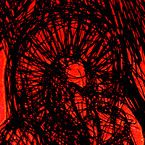Capt. Harlock
Posts: 5358
Joined: 9/15/2001
From: Los Angeles
Status: offline

|
150 Years Ago Today:
Missouri was officially still in the Union, but the "facts on the ground" were much more complex. St. Louis was firmly in Union hands, the southwestern quadrant was firmly in Rebel hands, and the rest of the state was seeing regular armies and marauding guerillas come and go. (Lexington was now back under Northern occupation, after Sterling Price had pulled back after the Battle of Fredericktown.)
Missouri governor Claiborne Jackson (the elected, pro-Southern one) decided on a more legalistic approach. He set up a provisional capital in the town of Neosho in southwest Missouri, and called the legislature into session. There is still controversy over whether or not Jackson's legislature had a quorum to permit it to convene, and as a result many historians consider it a "rump" legislature. (The Senate's journal was recently found at the Wilson's Creek National Battlefield, but the House journal with its roll call remains undiscovered.)
The legislature took up a bill for Missouri's secession from the Union, citing various "outrages" committed against the state and the overthrow of its government by the late Nathaniel Lyon.
On this date as well, the Cherokee approved their Declaration of Causes, a remarkably eloquent document (and also prescient):
Declaration by the People of the Cherokee Nation of the Causes
Which Have Impelled Them to Unite Their Fortunes With Those of the
Confederate States of America.
When circumstances beyond their control compel one people to sever the ties which have long existed between them and another state or confederacy, and to contract new alliances and establish new relations for the security of their rights and liberties, it is fit that they should publicly declare the reasons by which their action is justified.
The Cherokee people had its origin in the South; its institutions are similar to those of the Southern States, and their interests identical with theirs. Long since it accepted the protection of the United States of America, contracted with them treaties of alliance and friendship, and allowed themselves to be to a great extent governed by their laws.
In peace and war they have been faithful to their engagements with the United States. With much of hardship and injustice to complain of, they resorted to no other means than solicitation and argument to obtain redress. . .
Throughout the Confederate States we saw this great revolution effected without violence or the suspension of the laws or the closing of the courts. The military power was nowhere placed above the civil authorities. None were seized and imprisoned at the mandate of arbitrary power. . .
But in the Northern States the Cherokee people saw with alarm a violated Constitution, all civil liberty put in peril, and all the rules of civilized warfare and the dictates of common humanity and decency unhesitatingly disregarded. In States which still adhered to the Union a military despotism has displaced the civil power and the laws became silent amid arms. Free speech and almost free thought became a crime. The right to the writ of habeas corpus, guaranteed by the Constitution, disappeared at the nod of a Secretary of State or a general of the lowest grade. The mandate of the Chief Justice of the Supreme Court was set at naught by the military power, and this outrage on common right approved by a President sworn to support the Constitution. War on the largest scale was waged, and the immense bodies of troops called into the field in the absence of any law warranting it under the pretense of suppressing unlawful combination of men. The humanities of war, which even barbarians respect, were no longer thought worthy to be observed. Foreign mercenaries and the scum of cities and the inmates of prisons were enlisted and organized into regiments and brigades and sent into Southern States to aid in subjugating a people struggling for freedom, to burn, to plunder, and to commit the basest of outrages on women; while the heels of armed tyranny trod upon the necks of Maryland and Missouri, and men of the highest character and position were incarcerated upon suspicion and without process of law in jails, in forts, and in prison-ships . . .
Whatever causes the Cherokee people may have had in the past, to complain of some of the Southern States, they cannot but feel that their interests and their destiny are inseparably connected with those of the South. The war now raging is a war of Northern cupidity and fanaticism against the institution of African servitude; against the commercial freedom of the South, and against the political freedom of the States, and its objects are to annihilate the sovereignty of those States and utterly change the nature of the General Government.
The Cherokee people and their neighbors were warned before the war commenced that the first object of the party which now holds the powers of government of the United States would be to annul the institution of slavery in the whole Indian country, and make it what they term free territory and after a time a free State; and they have been also warned by the fate which has befallen those of their race in Kansas, Nebraska, and Oregon that at no distant day they too would be compelled to surrender their country at the demand of Northern rapacity, and be content with an extinct nationality, and with reserves of limited extent for individuals, of which their people would soon be despoiled by speculators, if not plundered unscrupulously by the State. . .
In now carrying this resolution into effect and consummating a treaty of alliance and friendship with the Confederate States of America the Cherokee people declares that it has been faithful and loyal to is engagements with the United States until, by placing its safety and even its national existence in imminent peril, those States have released them from those engagements.
Menaced by a great danger, they exercise the inalienable right of self-defense, and declare themselves a free people, independent of the Northern States of America, and at war with them by their own act. Obeying the dictates of prudence and providing for the general safety and welfare, confident of the rectitude of their intentions and true to the obligations of duty and honor, they accept the issue thus forced upon them, unite their fortunes now and forever with those of the Confederate States, and take up arms for the common cause, and with entire confidence in the justice of that cause and with a firm reliance upon Divine Providence, will resolutely abide the consequences.
Tahlequah, C. N., October 28, 1861.
THOMAS PEGG,
President National Committee.
JOSHUA ROSS,
Clerk National Committee.
Concurred.
LACY MOUSE,
Speaker of Council.
THOMAS B. WOLFE,
Clerk Council.
Approved.
JNO. ROSS.
The complete document is available at:
http://www.civilwarhome.com/cherokeecauses.htm
< Message edited by Capt. Harlock -- 10/28/2011 8:32:18 PM >
_____________________________
Civil war? What does that mean? Is there any foreign war? Isn't every war fought between men, between brothers?
--Victor Hugo
|
 Printable Version
Printable Version










 - I've seen less about the Union service than the Confederate. I understand McClellan relied on Pinkertons and they habiyually overstated confederate troop numbers.
- I've seen less about the Union service than the Confederate. I understand McClellan relied on Pinkertons and they habiyually overstated confederate troop numbers.











 New Messages
New Messages No New Messages
No New Messages Hot Topic w/ New Messages
Hot Topic w/ New Messages Hot Topic w/o New Messages
Hot Topic w/o New Messages Locked w/ New Messages
Locked w/ New Messages Locked w/o New Messages
Locked w/o New Messages Post New Thread
Post New Thread